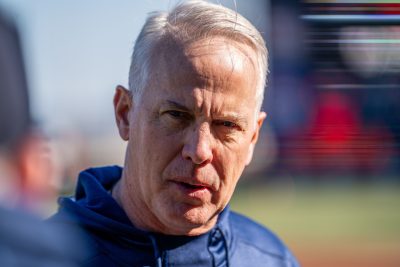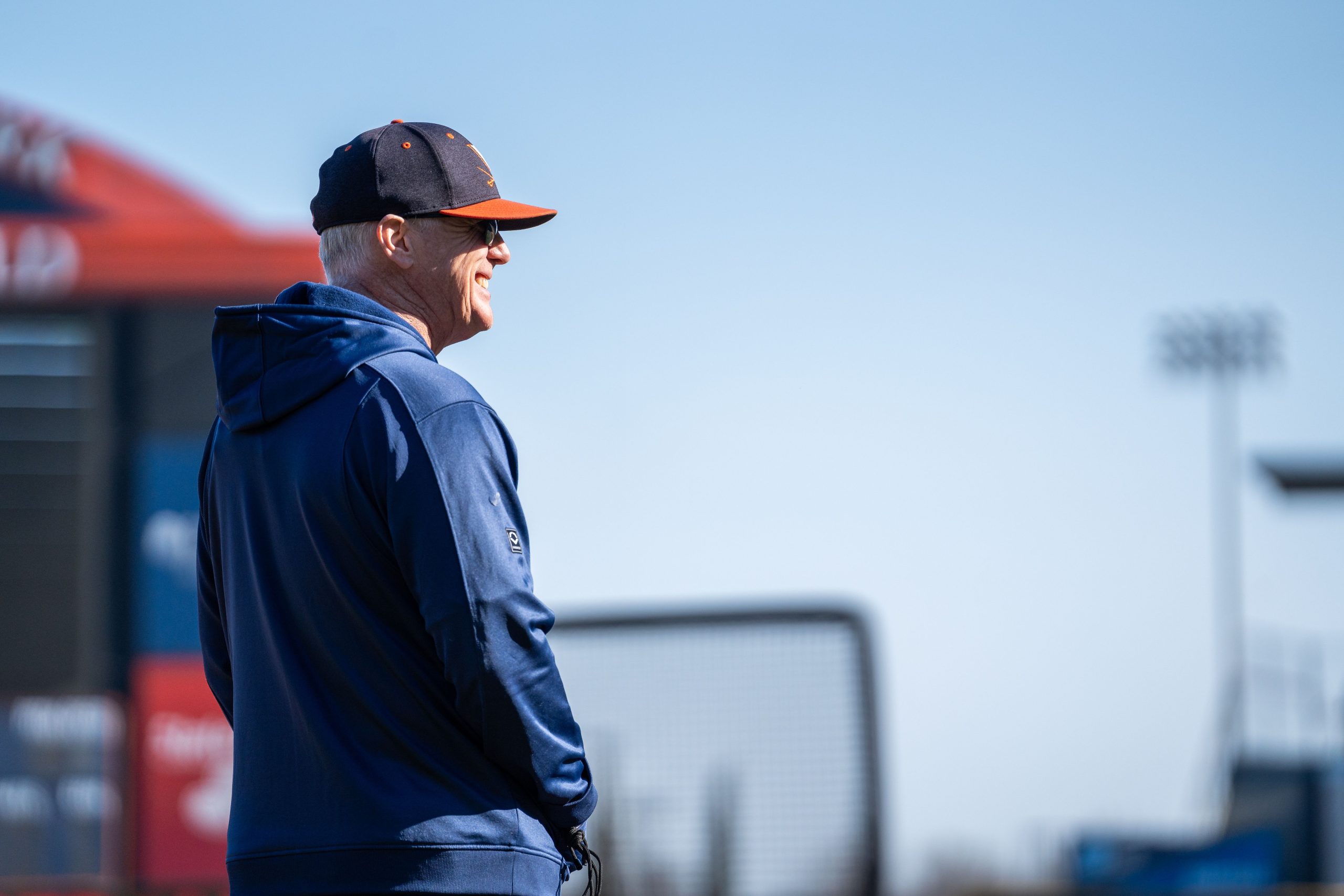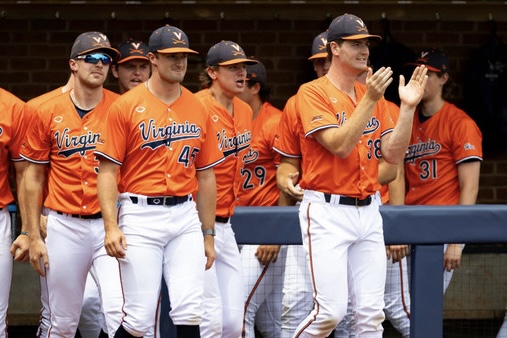By Jerry Ratcliffe

Virginia’s watch party for the NCAA baseball tournament selection show started out hopeful for the Cavaliers but turned glum when the team learned its fate on Monday. UVA wasn’t included in the 64-team field, a rare fate for a Brian O’Connor team (18 invites since 2004).
The longtime Wahoos skipper didn’t like the end result but accepted the outcome, making no excuses. Still, he felt the sorrow of his team.
“Heartbroken, right?” O’Connor said. “When you pour everything into what you do and it doesn’t happen …” He didn’t finish his thought. Didn’t need to. The team was devastated that it couldn’t continue UVA’s postseason tradition, even though it finished the campaign hot, winning 12 of its last 15 games.
“They knew they were on the bubble. They knew this could happen,” O’Connor said. “But they believed, they had hope.”
Virginia was convinced enough that it would make the field that the team practiced all weekend leading up to Monday’s selection show. Then came the cold slap of reality, with a low RPI, low strength of schedule and too many losses to mid-major teams.
“We prepared like we were in the tournament and they were heartbroken, and they should be,” the coach said. “I wanted them to watch the [selection] show, whether we got in or not. If we didn’t get in, I wanted them to know what it felt like, and that feeling carries over.”
O’Connor said his heart ached for his players, but that being snubbed was a lesson that you get what you earn in life.
“Sometimes in this sport, at the highest level, it comes down to a game or two, whether you earn the opportunity or not,” O’Connor said. “It comes down to a game or a pitch or a play when you do get the opportunity. The margins are very small to get into the NCAA Tournament when you put yourself in the position that we did, and that’s what happened.”
The coach pointed out he was proud of the way his team responded on the back half of the schedule, winning 20 of its last 26 games, beating ACC regular-season champion Georgia Tech on the road, sweeping Miami, taking a road series against rival Virginia Tech. O’Connor said despite being left out of the NCAAs, it didn’t diminish how the team rallied to put itself in position for a possible bid.
“Unfortunately, it just wasn’t enough in the first half,” O’Connor said. “A few games cost us the opportunity. That’s what it came down to. I’ve never been one to profess how we should have been in or analyze it. What I analyzed is what we did OK and the situation that we put ourselves in.
“As the leader of this program, I own that. It’s my responsibility. The players play the game. I manage the season and the emotions and ups and downs of it all. So as the leader of the program, I own it that we didn’t get into the NCAA Tournament. I’m not going to make any excuses. Sometimes it comes down to a game or two.”
O’Connor pointed out to his team following the selection show that Virginia’s program has been called more times than it hasn’t, and wanted everyone involved to keep things in perspective about this one season falling a little short. The program has been to the College World Series three times in the previous four years.
“I think sometimes people want to think, ‘Well, what’s going on? Did we take a step back?’” the coach said.
“It’s a tough business and I don’t shy away from it. I love being challenged at the highest level and being held to a standard of success.”
The coach said it was easy for critics to say it came down to a sloppy loss to Boston College in the ACC Tournament opener, that if the Cavaliers had won that game, things would have turned out differently.
“That’s too much to put on a group of young men,” O’Connor said. “We play a lot of games. I remind the guys throughout the season, that ‘Hey, this game in front of us, this midweek game, you don’t know which one it’ll be that gets you in [the NCAAs] or doesn’t get you in, and we just didn’t do that consistently enough. And I own that as the leader of the program.”
The NCAA selection committee pointed out several midweek losses as a sticking point, as well as having not played some of the ACC’s elite programs during the season, which impacted UVA’s RPI and strength-of-schedule ranking. O’Connor explained those situations to add clarity.
When the ACC schedule came out, he was somewhat concerned that some of the top teams in the league were missing from UVA’s slate, due to the conference rotation of 18 teams.
“I thought about it, that those are some of the traditional powers,” O’Connor said. “I’m sure those schools looked at the schedule and said, geez, we don’t have Virginia on our schedule, but that’s the way these big conferences are now.
“It rotates every year and you really don’t know until the games start to be played who is going to be really good. I mean, Louisville the last two seasons was not in the NCAA Tournament.”
He pointed out that most prognosticators felt Stanford was going to have an awesome year, potentially a team that would finish in Omaha.
Virginia went 16-11 in the ACC, and what bewildered O’Connor was that most every year that any league team has finished with that kind of record, they made it to the NCAAs. The coach was right. This was the first time since 1994 that a team finished five games above .500 in the ACC and was left out of the NCAAs.
“Well this year it didn’t because of some of our midweek losses. Historically, at least over the last three years or so, we have dominated outside of the conference. We didn’t dominate this year. We had some flaws.”
O’Connor believed that if his team had won two or more of those nonconference games, maybe one more ACC game, there wouldn’t have been a conversation about Virginia being snubbed.
The committee also pointed out UVA’s strength of schedule (No. 257 in the country), impacted by the absence of some of the ACC’s upper-echelon teams, and because some of the nonconference teams that typically field strong programs with good RPI had down years.
“The challenge with the nonconference schedule is that those games are scheduled three years out,” O’Connor explained. “You look at the teams that we played twice in the middle of the week, right in our own state, and you look at what their RPI was inside 80 or 75, and they were well below 200 this year.”
For example, Virginia’s 2026 schedule is already 98-percent complete.
He pointed out that he wanted this year’s team to be challenged right out of the gate and scheduled two opening-season tournaments in Puerto Rico and Texas against teams like Oregon State, Oklahoma and Michigan to test his players early. Still, when he agreed to play in those events, he really didn’t know what other teams were in the field until the brackets came out.
O’Connor has always played a lot of in-state teams in the nonconference portion of the schedule, which usually is a positive, but is somewhat limited with midweek opponents because of an inability to travel far for those games.
“We’re geographically challenged a little,” he said. “We can’t get on a bus in the middle of the week and drive somewhere for six hours to play. They’re students, too.”
O’Connor is aware of critics who suggest Virginia should play more SEC opponents in the middle of the week.
“How do you do that?” he questioned. “Clemson can play Georgia (and South Carolina) because they are in close proximity. The schools in our league that are farther south can do that. That said, over two decades, our scheduling model has worked. It has allowed us to be top-eight national seeds, it’s allowed us to host regionals and super regionals. It didn’t this year because we didn’t take care of what we traditionally take care of.”
O’Connor plans to examine the schedule for the future (although it’s too late to address the 2026 slate) and if changes need to be made, especially early in future schedules, he’ll address those needs.


